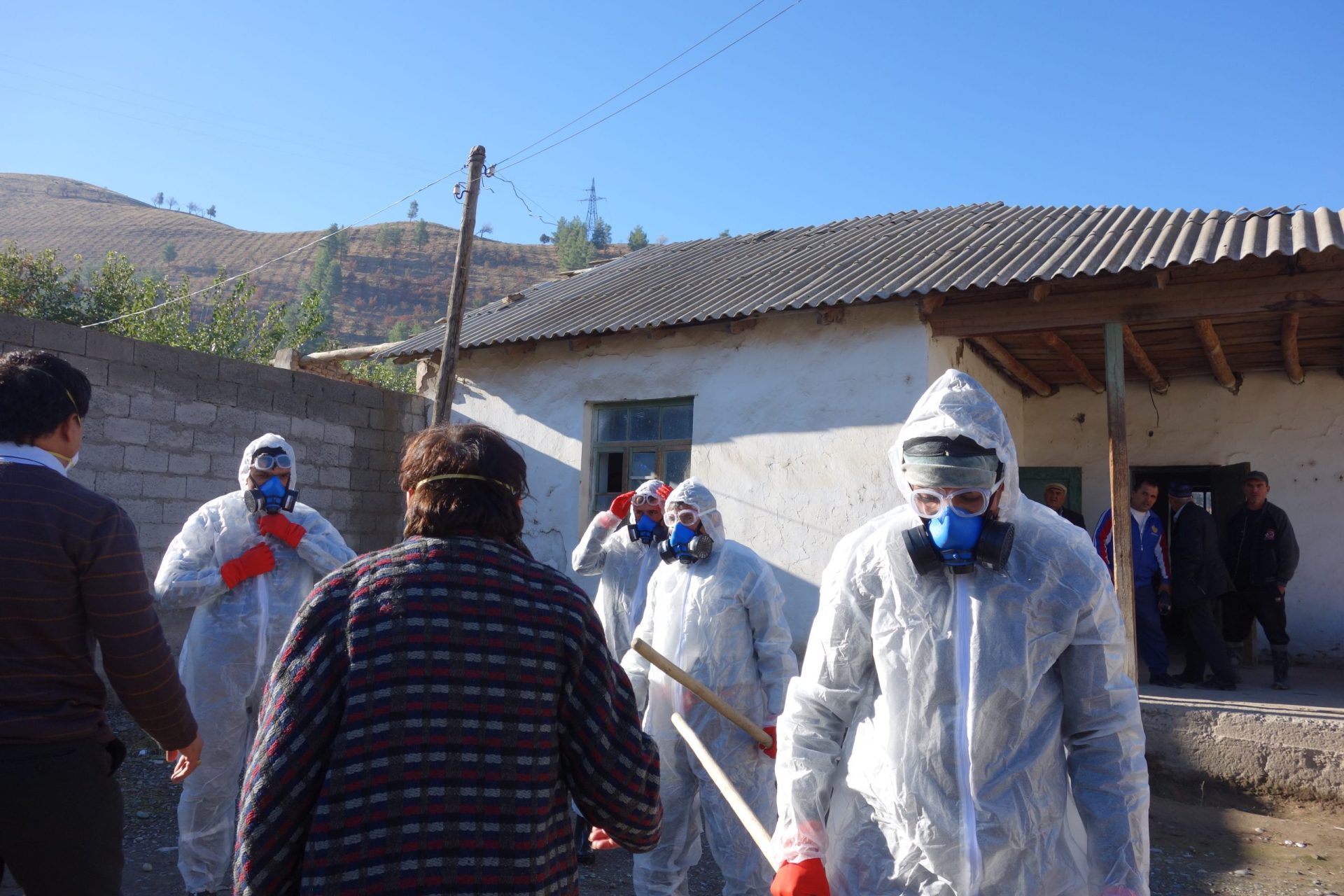In Tajikistan, in an area near the Afghan border lined with checkpoints and guards with guns, a Pure Earth team conducting pesticide cleanups was showered with hospitality. They were welcomed in home after home and were even invited to a wedding!
At one home, the owner’s 12-year-old son climbed up a persimmon tree to pick some fruit for the group. According to local tradition, the man related, any stranger who knocks on a home’s door would be welcomed.
 Local hospitality. A boy picks fruit for Pure Earth team members.
Local hospitality. A boy picks fruit for Pure Earth team members.
Living with Poison in Farkhor and Ziraki
The team was visiting homes in Farkhor and Ziraki, two areas in Tajikistan littered with large amounts of highly toxic pesticides, including DDT, which had once been used by cotton farms in the area. Following the dismantling of the Soviet Union, the pesticides were left abandoned in unsafe conditions–they sat in disintegrating bags, which leaked poison for decades.
Pure Earth was in Tajikistan not only to remove the pesticides from two crumbling warehouses, but also to educate residents about the pollution threat, and what they can do to protect themselves.
 The team talking to residents about pesticide exposure problem in their neighborhood.
The team talking to residents about pesticide exposure problem in their neighborhood.
The outreach team included university students from the capital of Dushanbe and members of a local NGO trained by Pure Earth. In talking to residents of the two communities about the pesticide problem, the team began to realize that many had been living with poison for so long that they did not notice it, even though the smell of pesticide was strong.
Moreover, over the years, residents would sometimes use the pesticides in their home gardens, and the community even stored food in the pesticide storage warehouses. With new houses being built on the contaminated land, more and more people were being put at risk.
Farkhor: 40 Bags of Pesticides Removed
In Farkhor, the team found three new houses constructed right next to old warehouses filled with pesticides. About 12 people lived there.
The Pure Earth team gathered about 20 soil samples from the courtyard, and took 50 readings with the XRF (X-ray fluorescence) analyzer, which registered arsenic and other heavy metals. Chickens, rabbits, and children were running around this contaminated yard.
It took three days for the team to properly contain the pesticides found at this site in secure bags to prevent further leaking. The bags were then loaded onto a truck and taken away to a secure storage site. In total, about 40 bags (31,066 kg) of pesticides were cleared from Farkhor.
 Testing the site with an XRF (X-ray fluorescence) analyzer.
Testing the site with an XRF (X-ray fluorescence) analyzer.
 The cleanup in progress.
The cleanup in progress.

Ziraki: 69 Bags of Pesticides Removed
In Ziraki, located just 1 km from the Afghan border, the Pure Earth team secured and removed 69 more bags of pesticides (12,971 kg), including one branded Kung Fu.
While no one was living on this warehouse site, the area was open to the public, with a grapevine nearby, and across from a field where children often played. A settlement of homes was located across the stream, which was likely contaminated. Locals were washing spoons in the water, which had a blueish hue, and a chicken was found dead in another body of water in the warehouse compound.
Local men watching the cleanup were offered respirators to use, but many declined because they were uncomfortable with the color of the respirators–they were pink. After an hour of work, members of the team started getting headaches. Soon after, some of the locals accepted the respirators.
 Some of the local men watching the work initially refused respirators because they were pink.
Some of the local men watching the work initially refused respirators because they were pink.
A Healthier Future for a Newly-Wed Couple
In total, the team removed about 110 bags (44,037 kg) of obsolete pesticides from the two towns and transported them to a specially designated hazardous waste storage area in Vakhsh. Pure Earth worked closely with the local government on the cleanups.
While owners of polluted sites are sometimes upset at the attention a cleanup can bring them, the landowners here welcomed the intervention. They understood that their land would now be more valuable for future projects.
During a lunch break, the team was invited to witness the local wedding that was taking place a short walk away. It was good to know that the young couple would begin a new phase of their lives in less toxic surroundings.
 The village wedding.
The village wedding.
Related:
In Tajikistan, Coalition of Local Groups Unite Against Abandoned Pesticide Problem
Global Team Profile: Umed in Tajikistan Saves Families From Homes Built On Toxic Land





